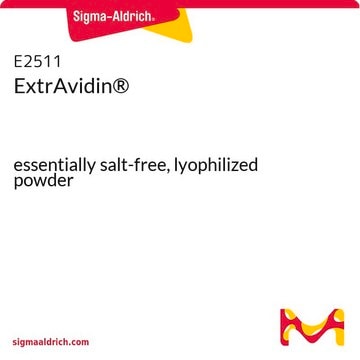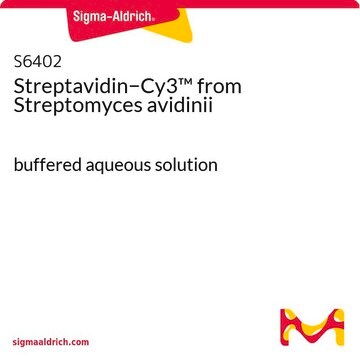E4142
ExtrAvidin®−Cy3™
buffered aqueous solution
Se connecterpour consulter vos tarifs contractuels et ceux de votre entreprise/organisme
About This Item
Produits recommandés
Conjugué
CY3 conjugate
Forme
buffered aqueous solution
Ampleur du marquage
3-9 mol Cy3 per mol protein
Technique(s)
immunohistochemistry (formalin-fixed, paraffin-embedded sections): 1:100
Conditions d'expédition
wet ice
Température de stockage
2-8°C
Application
ExtrAvidin®-Cy3™ is suitable for the following applications:
- Immunohistochemistry (formalin-fixed, paraffin-embedded sections) at a dilution of 1:100
- Immunocytochemistry.
- Used for labeling.
Actions biochimiques/physiologiques
Avidin is a tetrameric or dimeric biotin-binding protein produced in the oviducts of birds, reptiles and amphibians and deposited in the whites of their eggs. It consists of four high affinity binding sites for biotin. ExtrAvidin® is prepared from egg white avidin. It is a modified form of affinity purified avidin and binds biotin with high specific activity of avidin with the low background staining of streptavidin, a biotin binding protein produced by the bacteria Streptomyces avidinii. ExtrAvidin® is covalently conjugated to Cy3 dye and is used for various techniques.
Forme physique
Solution in 0.01 M phosphate buffered saline, containing 1% bovine serum albumin and 15 mM sodium azide
Notes préparatoires
Affinity purified protein
Informations légales
Cy3 is a trademark of Cytiva
ExtrAvidin is a registered trademark of Merck KGaA, Darmstadt, Germany
Clause de non-responsabilité
Unless otherwise stated in our catalog or other company documentation accompanying the product(s), our products are intended for research use only and are not to be used for any other purpose, which includes but is not limited to, unauthorized commercial uses, in vitro diagnostic uses, ex vivo or in vivo therapeutic uses or any type of consumption or application to humans or animals.
Code de la classe de stockage
12 - Non Combustible Liquids
Classe de danger pour l'eau (WGK)
WGK 3
Point d'éclair (°F)
Not applicable
Point d'éclair (°C)
Not applicable
Certificats d'analyse (COA)
Recherchez un Certificats d'analyse (COA) en saisissant le numéro de lot du produit. Les numéros de lot figurent sur l'étiquette du produit après les mots "Lot" ou "Batch".
Déjà en possession de ce produit ?
Retrouvez la documentation relative aux produits que vous avez récemment achetés dans la Bibliothèque de documents.
A Signore et al.
Diabetologia, 40(12), 1476-1479 (1998-02-03)
The non-obese diabetic (NOD) mouse is widely used to study the pathogenesis of insulin-dependent diabetes mellitus. However, the mechanisms responsible for beta-cell destruction, in this model, are still poorly defined. The CD95/CD95L system among other effector systems has been implicated
L A Ballsmider et al.
Neural plasticity, 2015, 601985-601985 (2015-02-28)
This study investigated the anatomical integrity of vagal innervation of the gastrointestinal tract following vertical sleeve gastrectomy (VSG) and Roux-en-Y gastric bypass (RYGB) operations. The retrograde tracer fast blue (FB) was injected into the stomach to label vagal neurons originating
Andrea-Romana Prusa et al.
Human reproduction (Oxford, England), 18(7), 1489-1493 (2003-07-02)
It is the hope of investigators and patients alike that in future the isolation of pluripotent human stem cells will allow the establishment of therapeutic concepts for a wide variety of diseases. A major aim in this respect is the
Brian K Kwon et al.
Proceedings of the National Academy of Sciences of the United States of America, 99(5), 3246-3251 (2002-02-28)
Scientific interest to find a treatment for spinal cord injuries has led to the development of numerous experimental strategies to promote axonal regeneration across the spinal cord injury site. Although these strategies have been developed in acute injury paradigms and
Adi Prizan-Ravid et al.
PLoS pathogens, 6(11), e1001183-e1001183 (2010-11-19)
The p12 protein is a cleavage product of the Gag precursor of the murine leukemia virus (MLV). Specific mutations in p12 have been described that affect early stages of infection, rendering the virus replication-defective. Such mutants showed normal generation of
Notre équipe de scientifiques dispose d'une expérience dans tous les secteurs de la recherche, notamment en sciences de la vie, science des matériaux, synthèse chimique, chromatographie, analyse et dans de nombreux autres domaines..
Contacter notre Service technique








